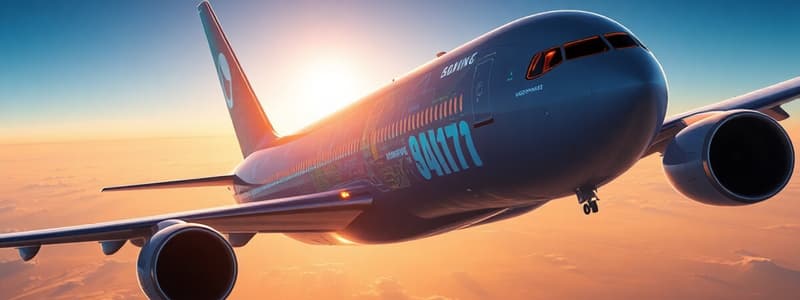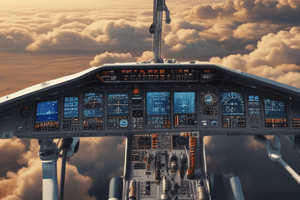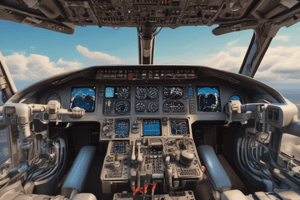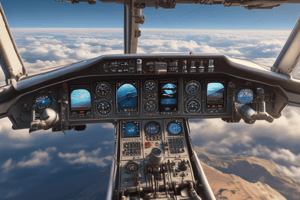Podcast
Questions and Answers
What functionality is exclusively available when the aircraft is on the ground?
What functionality is exclusively available when the aircraft is on the ground?
- Loudspeakers Level Adjustment
- Software Loading for all cabin systems
- Cabin Programming configuration (correct)
- Panel loudspeaker volume control
Which component serves as the controller in the CIDS architecture?
Which component serves as the controller in the CIDS architecture?
- CIDS directors (correct)
- Flight Attendant Panel
- Modular components
- Bus lines
What is the purpose of the software loading function in CIDS?
What is the purpose of the software loading function in CIDS?
- To change the cabin layout
- To indicate internal settings of the flight attendant panel
- To update the software of all cabin system components (correct)
- To adjust loudspeaker output
Which feature allows for manual adjustment of cabin loudspeaker output?
Which feature allows for manual adjustment of cabin loudspeaker output?
What type of layouts does the CIDS provide for cabin configuration?
What type of layouts does the CIDS provide for cabin configuration?
Which function is used to control settings like screen brightness on the Flight Attendant Panel?
Which function is used to control settings like screen brightness on the Flight Attendant Panel?
Which part of the CIDS provides an interface for internal cabin communication adjustments?
Which part of the CIDS provides an interface for internal cabin communication adjustments?
How is access to certain menu functions within the Flight Attendant Panel controlled?
How is access to certain menu functions within the Flight Attendant Panel controlled?
What functions do the Centralised control commands via the MP FAPs manage?
What functions do the Centralised control commands via the MP FAPs manage?
How is the evacuation signalling controlled in the cabin system?
How is the evacuation signalling controlled in the cabin system?
Which element is NOT directly controlled by the cabin system?
Which element is NOT directly controlled by the cabin system?
What was one of the key advancements in avionics architecture starting with the Boeing 777?
What was one of the key advancements in avionics architecture starting with the Boeing 777?
Which component allows passengers to control their reading lights?
Which component allows passengers to control their reading lights?
What does the cabin system use to interface with the air conditioning system?
What does the cabin system use to interface with the air conditioning system?
What is a significant limitation of the traditional ARINC 429 federated architecture?
What is a significant limitation of the traditional ARINC 429 federated architecture?
How is the water/waste system mainly controlled according to the cabin system?
How is the water/waste system mainly controlled according to the cabin system?
Which of the following best describes the data exchange capability of the federated architecture mentioned?
Which of the following best describes the data exchange capability of the federated architecture mentioned?
Which feature of the cabin system allows for control of window shades?
Which feature of the cabin system allows for control of window shades?
What is one advantage of the Integrated Modular Avionics (IMA) over traditional systems?
What is one advantage of the Integrated Modular Avionics (IMA) over traditional systems?
What does the ADN interface with in relation to passenger services?
What does the ADN interface with in relation to passenger services?
What technological development in avionics began to be implemented around 1987?
What technological development in avionics began to be implemented around 1987?
What is the maximum bit rate achievable with classic ethernet-based data communication in IMA?
What is the maximum bit rate achievable with classic ethernet-based data communication in IMA?
Which function was incorporated into IMA systems that was previously handled by independent LRUs?
Which function was incorporated into IMA systems that was previously handled by independent LRUs?
What characterizes the general arrangement of Integrated Modular Avionics (IMA)?
What characterizes the general arrangement of Integrated Modular Avionics (IMA)?
What functions does the In-Flight Entertainment (IFE) System supply to passengers?
What functions does the In-Flight Entertainment (IFE) System supply to passengers?
How does the IFE system ensure connectivity to broader networks?
How does the IFE system ensure connectivity to broader networks?
Which component of the IFE system is responsible for managing interactive functions such as games and gambling?
Which component of the IFE system is responsible for managing interactive functions such as games and gambling?
What is the primary role of the Cabin Distribution Network (CDN) in the IFE system?
What is the primary role of the Cabin Distribution Network (CDN) in the IFE system?
What feature of the IFE allows passengers access to telephone networks?
What feature of the IFE allows passengers access to telephone networks?
What determines whether mobile phone use is allowed on flights?
What determines whether mobile phone use is allowed on flights?
Which component is connected to the IFE equipment through the Cabin Distribution Network?
Which component is connected to the IFE equipment through the Cabin Distribution Network?
What aspect of the In-Flight Entertainment (IFE) system responds to passenger requests for entertainment?
What aspect of the In-Flight Entertainment (IFE) system responds to passenger requests for entertainment?
What is a key purpose of the information systems on aircraft?
What is a key purpose of the information systems on aircraft?
Which statement best describes the structure of the onboard information system?
Which statement best describes the structure of the onboard information system?
How do the information systems enhance flight crew operations?
How do the information systems enhance flight crew operations?
What is a benefit of using electronic forms in aircraft information systems?
What is a benefit of using electronic forms in aircraft information systems?
How do health management systems contribute to aircraft operations?
How do health management systems contribute to aircraft operations?
Which statement correctly characterizes the communication capabilities of the aircraft information system?
Which statement correctly characterizes the communication capabilities of the aircraft information system?
What type of applications does the aircraft information system host?
What type of applications does the aircraft information system host?
Which of the following is NOT a characteristic of the aircraft information systems?
Which of the following is NOT a characteristic of the aircraft information systems?
What is one of the main benefits of using the Boeing AHM system for airlines?
What is one of the main benefits of using the Boeing AHM system for airlines?
What function does Airbus AIRMAN primarily serve for aircraft operators?
What function does Airbus AIRMAN primarily serve for aircraft operators?
How does the e-Logbook improve the process of maintaining aircraft?
How does the e-Logbook improve the process of maintaining aircraft?
In what way does the AHM system assist airlines after a flight?
In what way does the AHM system assist airlines after a flight?
What is one of the primary functions of the AIRMAN application developed by Airbus?
What is one of the primary functions of the AIRMAN application developed by Airbus?
Which of the following describes a key feature of the Electronic Logbook?
Which of the following describes a key feature of the Electronic Logbook?
Which statement best reflects the interaction between AHM and ground operations?
Which statement best reflects the interaction between AHM and ground operations?
What type of data does the e-Logbook primarily interface with?
What type of data does the e-Logbook primarily interface with?
Flashcards
Integrated Modular Avionics (IMA)
Integrated Modular Avionics (IMA)
A digital architecture for aircraft avionics, using a unified system to manage several functions, once separate hardware elements.
Federated Architecture
Federated Architecture
A system design where different subsystems operate independently on their own hardware.
ARINC 429
ARINC 429
A legacy aircraft data bus, using individual data 'words'.
IMA Advantage
IMA Advantage
Signup and view all the flashcards
Ethernet-based Communication
Ethernet-based Communication
Signup and view all the flashcards
Bit Rate
Bit Rate
Signup and view all the flashcards
LRU (Line Replaceable Unit)
LRU (Line Replaceable Unit)
Signup and view all the flashcards
Airplane Information Management System (AIMS)
Airplane Information Management System (AIMS)
Signup and view all the flashcards
Cabin Lighting Control
Cabin Lighting Control
Signup and view all the flashcards
Emergency Evacuation Signalling
Emergency Evacuation Signalling
Signup and view all the flashcards
Illuminated Sign Control
Illuminated Sign Control
Signup and view all the flashcards
Passenger Call Function
Passenger Call Function
Signup and view all the flashcards
CIDS Software Updates
CIDS Software Updates
Signup and view all the flashcards
IFE and Cabin System Interaction
IFE and Cabin System Interaction
Signup and view all the flashcards
CIDS Cabin Layouts
CIDS Cabin Layouts
Signup and view all the flashcards
Cabin Temperature Control
Cabin Temperature Control
Signup and view all the flashcards
Water/Waste System Control
Water/Waste System Control
Signup and view all the flashcards
CIDS Cabin Programming
CIDS Cabin Programming
Signup and view all the flashcards
Electric Window Shade Control
Electric Window Shade Control
Signup and view all the flashcards
Loudspeaker Level Adjustment
Loudspeaker Level Adjustment
Signup and view all the flashcards
Flight Attendant Panel Settings
Flight Attendant Panel Settings
Signup and view all the flashcards
CIDS Modular Design
CIDS Modular Design
Signup and view all the flashcards
CIDS Architecture
CIDS Architecture
Signup and view all the flashcards
CIDS Access Codes
CIDS Access Codes
Signup and view all the flashcards
Cabin Door/Slide Status
Cabin Door/Slide Status
Signup and view all the flashcards
In-Flight Entertainment (IFE)
In-Flight Entertainment (IFE)
Signup and view all the flashcards
IFE System Components
IFE System Components
Signup and view all the flashcards
Mobile Phone Use in-flight
Mobile Phone Use in-flight
Signup and view all the flashcards
In-flight internet
In-flight internet
Signup and view all the flashcards
IFEC Connections
IFEC Connections
Signup and view all the flashcards
Cabin Distribution Network (CDN)
Cabin Distribution Network (CDN)
Signup and view all the flashcards
Wi-Fi Provision
Wi-Fi Provision
Signup and view all the flashcards
Aircraft Information Systems
Aircraft Information Systems
Signup and view all the flashcards
Aircraft Information System Benefits
Aircraft Information System Benefits
Signup and view all the flashcards
Boeing's Airplane Health Management (AHM)
Boeing's Airplane Health Management (AHM)
Signup and view all the flashcards
Airbus' AIRMAN
Airbus' AIRMAN
Signup and view all the flashcards
Health Management Systems Purpose
Health Management Systems Purpose
Signup and view all the flashcards
Information System Security
Information System Security
Signup and view all the flashcards
Centralized Data Management
Centralized Data Management
Signup and view all the flashcards
Modular System Design
Modular System Design
Signup and view all the flashcards
Aeroplane Health Management (AHM)
Aeroplane Health Management (AHM)
Signup and view all the flashcards
AIRMAN
AIRMAN
Signup and view all the flashcards
Electronic Logbook (e-Logbook)
Electronic Logbook (e-Logbook)
Signup and view all the flashcards
e-Logbook Function 1: Defect Reporting
e-Logbook Function 1: Defect Reporting
Signup and view all the flashcards
e-Logbook Function 2: Maintenance Action Reporting
e-Logbook Function 2: Maintenance Action Reporting
Signup and view all the flashcards
e-Logbook Function 3: Aircraft Release After Maintenance
e-Logbook Function 3: Aircraft Release After Maintenance
Signup and view all the flashcards
How Does AHM Data Reach Ground Control?
How Does AHM Data Reach Ground Control?
Signup and view all the flashcards
How Does e-Logbook Combine Information?
How Does e-Logbook Combine Information?
Signup and view all the flashcards
Study Notes
Typical Electronic/Digital Aircraft Systems II (5.15)
- Learning objectives include describing the general arrangement and BITE testing capabilities of Integrated Modular Avionics (IMA), Cabin Systems, and Information Systems, all at Level 2.
Integrated Modular Avionics (IMA) Background
- The Boeing 767 and 757 were the first commercial aircraft to use digital federated architecture.
- In 1987, the industry recognized the need for transferring data files instead of individual data "words."
- The Boeing 777 led the way for Integrated Modular Architecture (IMA) with the Airplane Information Management System (AIMS).
- Traditional avionic systems are based on federated architectures, where subsystems are physically separated and difficult to expand.
- Additional LRUs require additional cable links to each other existing LRU, making expansion complex.
- Bit rate in traditional systems is up to 100Kbps, and data exchange is unidirectional.
IMA Advantages
- IMA systems are on a common platform, sharing resources like memory and processors, increasing utilization.
- IMA is more efficient because of reduced weight, size, power consumption and recurring costs.
- Airbus's A380 avionics suite has a 50% reduction in processor units.
- IMA replaces point-to-point cabling with a virtual backplane data communications network.
- LRUs can adapt to changes in network function or operating mode and have a potential path between any LRUs, making the system very robust.
Classic ARINC 429 Ethernet - Improved Bit Rate
- Ethernet-based data communication requires a connection to a common ethernet bus for transmission and reception.
- Bit rates are improved to 10 Mbps.
- Switched ethernet (using routers/switches) eliminates delays in large systems by directing or buffering traffic.
Cabin Systems Overview
- The cabin system provides an interface for crew to the cabin core and monitoring systems, and allows passengers to use the entertainment system.
- The cabin system has 3 subsystems: cabin core, cabin monitoring, and in-flight entertainment (IFE).
Cabin Core System
- In general, cabin core subsystems include the following: Cabin Intercommunication Data System (Airbus) or Cabin Service System Controller (Boeing).
- CIDS/CSSC operates, controls, monitors, transmits data related to passengers and cabin crew.
- Different systems and unit tests can be conducted.
- Airbus system includes two CIDS directors, touchscreen Flight Attendant Panels (FAPs), and mini FAPs.
- The FAPs, connected to directors, are connected to systems used by passengers and crew.
Basic CIDS Operations
- Software Loading: Updating cabin system components software is done using the Flight Attendant Panel.
- Layout Selection: Three predefined and three modifiable cabin layouts are available from the Flight Attendant Panel (requires access code).
- Cabin Programming: Configuring the zones for the cabin functions is done using the Flight Attendant Panel.
- Loudspeakers Level Adjustment: Cabin's loudspeaker output can be manually adjusted for announcements and chimes.
Flight Attendant Panel Set-Up
- The panel is used to control internal settings, including panel loudspeaker volume and screen brightness.
CIDS Architecture
- The CIDS is modular, adapting to cabin layout and functional requirements.
- The general concept is based on a controller, bus lines, and a network concept.
- CIDS directors are responsible for controller functions.
- All CIDS components are connected to two identical directors, one active and one in hot standby, monitoring performance.
- Faults detected are sent to the Warning and Maintenance System (WMS) and/or the FAP.
Multi-Purpose Flight Attendant Panel (MP FAP)
- Touchscreen interfaces allow cabin attendants to select functions like cabin illumination, cabin programming, and access sub-panels with hard keys.
- Mini-FAPs enable cabin crew to control and monitor cabin support systems and passenger-related functions within a specific cabin zone.
Additional Indication Panels (AIPs)
- Display passenger address related information and interphone information.
- Installed at all attendant stations.
Additional Attendant Panels (AAPs)
- Enable attendants to control cabin support systems and passenger-related functions within a specific zone.
Cabin Monitoring System - Communication Functions
- Includes Passenger Address (PA) system, Cabin Interphone, and Service Interphone.
Passenger Address (PA)
- Distributes PA announcements from cockpit or attendant stations to cabin speakers and passenger headsets.
- Source with higher priority interrupts lower priority announcements.
Cabin Interphone
- Used for communication between cabin crew stations and cockpit and cabin crew stations.
- Multiple links can simultaneously be initialised.
Service Interphone
- Allows communication between ground, cockpit, and cabin crew.
- Uses service interphone jacks, cockpit acoustic equipment, cockpit handsets, and cabin handsets.
Cabin Monitoring System Control Functions
- Cabin system controls cabin general lighting and passenger reading lights independently in each zone, deck, and room.
- Control commands are entered through MP FAPs, optional AAPs, and optional Mini-FAPs and for passenger lights, PSUs and IFE.
Emergency Evacuation
- Cabin systems control evacuation signalling in all areas and the cockpit.
Illuminated Signs
- Cabin system controls lighting for exit signs, "No Smoking" signs, fasten seat belt signs, and "Lavatory occupied" signs.
Passenger Call
- Passenger call function can be activated on passenger seats (via IFE) and reset at attendant stations (via flight attendant panel).
In Flight Entertainment (IFE)
- IFE supplies audio, video, data, and interactive functions.
- IFE also gives access to telephone and data network, via satellite communications link.
Wi-Fi
- Provides in-flight internet service through satellite or air-to-ground networks.
IFE System Architecture
- IFE system contains IFE Centre (IFEC), cabin distribution network, and passenger in-seat equipment.
- IFEC connects to Remote Control Centre (RCC), Flight Attendant Panels (FAPs). and Cabin Distribution Network (CDN).
IFE Components
- The Cabin Work Station (CWS) provides a central location for cabin crew operations, including CIDS, PRAM, IFE, logbook, cabin crew email, passenger profiles, and electronic documentation.
Remote Control Centres (RCCs)
- Additional IFE control panels are installed.
- RCCs receive IFE control from locations outside the cabin workstation and interface with Area Distribution Boxes (ADBs) in the cabin network.
Area Distribution Boxes (ADBs)
- ADBs are situated along the aircraft's centreline, supplying network data, interactive data, passenger service data, and database information to the Seat Electronics Boxes (SEBs).
- ADBs use fiber optic/Ethernet to communicate.
Floor Disconnect Boxes (FDBs)
- Provide audio, video, data, telephone and service data from the ADBs to seating areas.
Seat Electronics Boxes (SEBs)
- Mounted beneath seats, supply network (Ethernet) data and digital video/audio distribution to passengers.
Seat Display Unit (SDU), Seat Video Unit (SVU)
- Touchscreen units display passenger video selections, routing service via Ethernet and decoding in the SDU.
- External USB ports are available for personal devices.
Handset Passenger Control Unit (PCU)
- Main passenger interface for IFE.
- Options include phone, keyboard, game controllers, and controls for reading lights and attendant calls.
Overhead Equipment
- These units receive Ethernet signals, decoding them into video format, to be distributed to overhead monitors and enabling control of several monitors.
- Wall-mounted and retractable display units offer overhead video entertainment.
Cabin Systems BITE Testing
- Refer to BITE Philosophy and BITE Function headings for generic information on BITE testing methodology for cabin systems.
- BITE management is typically available through the FAP display and the flight deck MCDU.
Information Systems
- Designed to improve flight, cabin, and maintenance operations while providing passenger services.
- A networked system of servers and routers, using secure digital communications for security.
- Centralizes data related to a flight—combining data and communication from different parts of the aircraft.
- Improves airline ground and flight operations by providing electronic forms (like logbooks), customized apps, and electronic documentation.
- Improves airline maintenance procedures with easy access to data that enables quick troubleshooting.
Health Management Systems
- Boeing Aircraft Health Management (AHM) monitors and interactively troubleshoots issues in flight, sending real-time data to ground operations.
- Airbus AIRMAN is a similar system.
Electronic Logbook (e-Logbook)
- Electronic logbook replaces paper logbooks for recording and sharing data, with easy access for crew.
Control and Indicating
- Maintenance personnel access e-logbooks through the Onboard Maintenance System (OMS) HMIs.
Studying That Suits You
Use AI to generate personalized quizzes and flashcards to suit your learning preferences.




